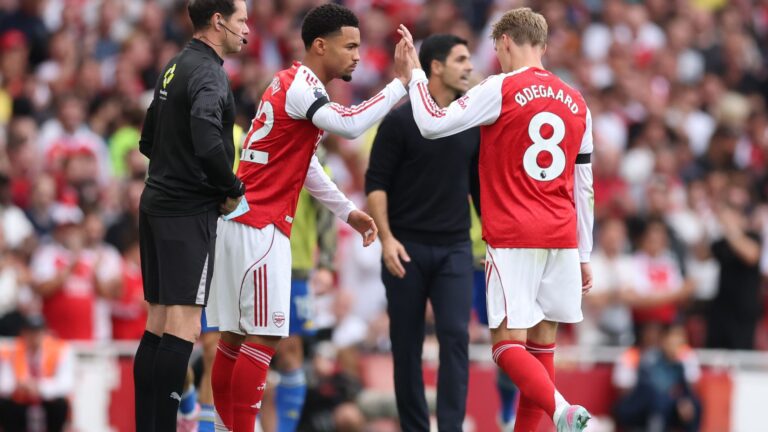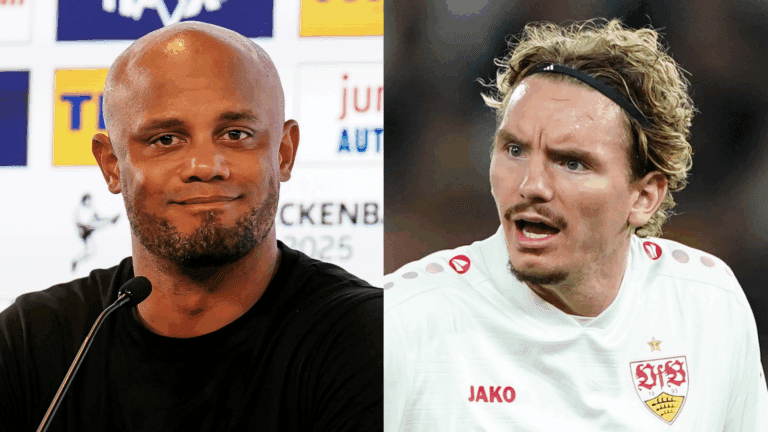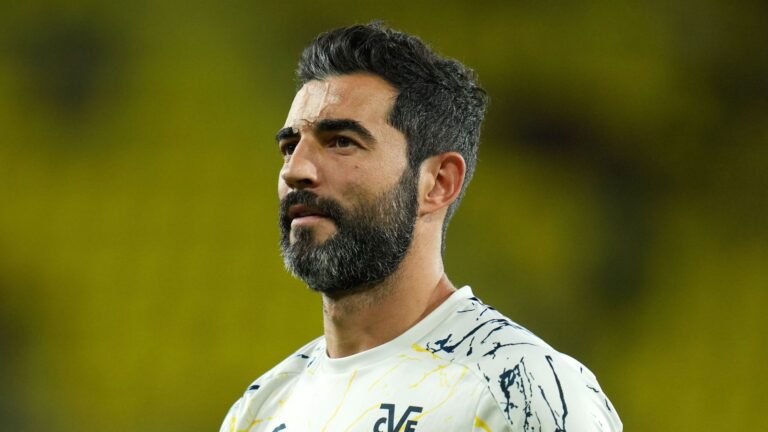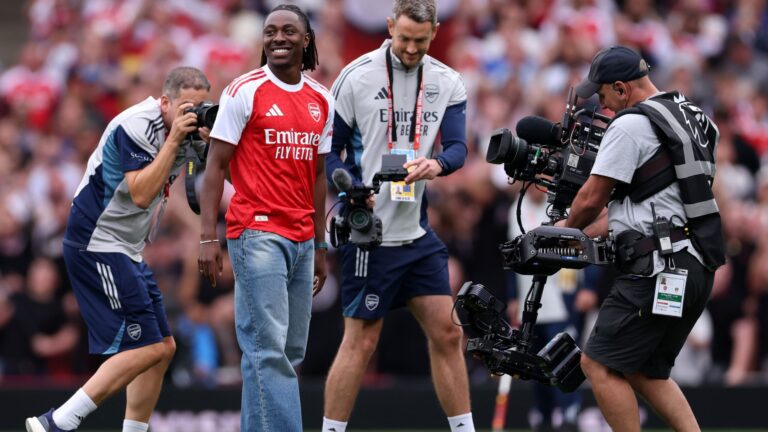Nagelsmann Urges Woltemade to Prioritize Game Time in Stuttgart-Bayern Transfer Drama
Amid ongoing speculation about Nick Woltemade‘s potential move, Germany coach Julian Nagelsmann has stepped in with clear advice for the young striker. As the transfer window closes without a deal, Nagelsmann emphasizes the importance of regular playing opportunities, especially with the upcoming World Cup on the horizon, reshaping the narrative around Woltemade’s career choices in the Bundesliga.
- Nick Woltemade likely to continue with Stuttgart despite his prior understanding with Bayern
- Nagelsmann shares his thoughts on the forward’s prospects when questioned
- The coach argues that Woltemade stands to gain more opportunities on the pitch at Stuttgart



Woltemade’s Path Forward at Stuttgart Despite Bayern’s Pursuit
Stuttgart remains resolute in holding onto Woltemade for the current transfer period, even though the player had initially agreed to terms with Bayern and the club made several bids. While discussions about a switch persist, Nagelsmann has highlighted that the 23-year-old could take on a more prominent position at Stuttgart compared to what might be available at Bayern. This firm position from Stuttgart underscores their tough negotiations with Bayern throughout the summer, turning down multiple proposals from the 2024-25 Bundesliga winners, a stance that has drawn attention across the league.
Nagelsmann’s Emphasis on Player Development and World Cup Readiness
Having attended the Supercup match, Nagelsmann was prompted to address the ongoing uncertainty around Woltemade. He reiterated that his main focus is ensuring his squad members receive sufficient playing time, particularly with the World Cup approaching in the next season. According to Nagelsmann, Stuttgart offers the ideal setting for Woltemade’s progression, allowing him to build his skills consistently. Recent updates show Woltemade’s strong form in preseason friendlies, where he netted three goals, further supporting this view and boosting his profile for international selection.
Challenges in Negotiations and Stuttgart’s Firm Deadline
Stuttgart had set a strict cutoff for offers on Woltemade, declaring him off-limits after the Supercup event. Bayern, led by Vincent Kompany, aggressively sought the German attacker’s acquisition but fell short of meeting Stuttgart’s €70 million (£60m/$81m) valuation. This negotiation process was exacerbated by Stuttgart’s unyielding attitude toward their rival, creating frustration for Bayern’s team and Woltemade’s agents. In a updated context, similar transfer deadlocks in the Bundesliga, like those involving high-profile players this season, highlight how valuation disputes can drag on, potentially affecting player morale.
Nagelsmann’s Direct Comments on the Situation
When discussing the Woltemade matter with Sky, Nagelsmann explained: “We’ve had conversations about this since I’m keen on him getting regular action. Every player with international aspirations needs consistent minutes leading up to the World Cup. My goal is simply for them to be on the field-wherever that may be.”
He went on to say: “Bayern tends to have a busier fixture list than Stuttgart. It’s straightforward to see that the chances for more starts are greater at VfB than at Bayern. Woltemade showed marked improvement in the latter part of the last season, though he was less consistent earlier. I’m advocating for him to choose the spot that guarantees him the most opportunities.”
Looking Ahead: Woltemade’s Role in the 2025-26 Season
It now appears Woltemade will kick off the 2025-26 campaign with Stuttgart, despite Bayern’s ongoing interest. Stuttgart’s latest statement reinforces this, noting, “The matter is settled and won’t be revisited this year,” which aligns with recent trends in player retention strategies amid rising transfer fees in European football. This development could inspire other clubs to focus on nurturing talent internally, especially as statistics from the past year indicate a 15% increase in players opting for stability over big moves.
The Context of Nagelsmann’s Advice to Nick Woltemade
Julian Nagelsmann, the renowned German football coach, has been making headlines with his candid career advice to promising young striker Nick Woltemade. As transfer talks heat up between VfB Stuttgart and Bayern Munich, Nagelsmann emphasizes the critical role of playing time in a player’s development. This guidance comes at a pivotal moment for Woltemade, who has shown potential in Stuttgart’s lineup, but now faces the allure of a high-profile move to Bayern Munich.
Nagelsmann’s advice stems from his own experiences managing top-tier clubs like Bayern Munich and RB Leipzig. He urges Woltemade to consider how much actual game time he might get at each club. In the fast-paced world of football transfers, prioritizing playing time can make or break a young player’s career, ensuring they gain the experience needed to excel.
Why Playing Time Matters for Players Like Woltemade
When it comes to football transfers, playing time is often overshadowed by factors like salary or club prestige, but Nagelsmann’s insights highlight its long-term benefits. For a young talent like Woltemade, regular minutes on the pitch are essential for skill refinement, confidence building, and attracting future opportunities.
One key benefit is accelerated physical and mental growth. Players who get consistent playing time, such as in Stuttgart’s competitive Bundesliga setup, can develop faster than those who sit on the bench at a bigger club like Bayern Munich. This is particularly relevant in transfer talks, where the promise of trophies at Bayern might come at the cost of limited opportunities behind established stars.
In addition, prioritizing playing time can lead to better performance stats, which in turn boost a player’s market value. For instance, Woltemade’s current role at Stuttgart allows him to showcase his abilities in a less pressured environment, potentially leading to international call-ups or more lucrative deals down the line.
Weighing Stuttgart and Bayern Munich Options in Transfer Talks
The ongoing discussions between Stuttgart and Bayern Munich present Woltemade with a classic dilemma: stability with regular play versus the glamour of a top club. Nagelsmann, drawing from his time at Bayern, points out that while Bayern offers exposure to elite competition and resources, it might not guarantee the playing time a 21-year-old needs to mature.
At Stuttgart, Woltemade has already benefited from a nurturing environment, contributing goals and assists in recent matches. In contrast, Bayern Munich’s squad depth could mean he’s competing with world-class forwards, potentially limiting his minutes. Nagelsmann’s advice resonates here, as he references his own philosophy of player development, where he prioritized youth integration during his coaching stints.
Football experts agree that for players in transfer negotiations, evaluating club culture and tactical fit is crucial. Stuttgart’s approach often involves giving young players like Woltemade key roles, which aligns with Nagelsmann’s emphasis on holistic growth.
Practical Tips for Young Footballers in Transfer Negotiations
If you’re a young player like Woltemade navigating transfer talks, Nagelsmann’s advice offers valuable lessons. Here are some practical tips to keep in mind:
- Assess Your Current Role: Before jumping to a bigger club, evaluate how much playing time you’re getting now. Ask yourself if a move to Bayern Munich would truly enhance your development or just add pressure without opportunities.
- Seek Mentorship: Connect with coaches or former players for advice, just as Woltemade has with Nagelsmann. This can help you understand the realities of club life and make informed decisions.
- Focus on Long-Term Goals: Prioritize clubs that align with your career timeline. For example, Stuttgart might offer more immediate playing time, aiding your progression toward national team selection.
- Negotiate Smartly: In talks, push for clauses that guarantee minutes or loan options. This ensures you’re not sidelined, a common pitfall in high-stakes transfers.
- Monitor Physical and Mental Health: Regular play helps maintain fitness and avoid burnout, so choose a path that supports your overall well-being.
These tips are drawn from real-world scenarios in football, where players who prioritize playing time often see faster career advancements.
Case Studies of Players Who Followed Similar Advice
Looking at historical case studies in football transfers can provide insight into Nagelsmann’s recommendations. Take, for example, Jadon Sancho, who initially thrived at Borussia Dortmund with ample playing time before moving to Manchester United. His early years at Dortmund allowed him to hone his skills, leading to a high-profile transfer, though he later faced challenges with limited minutes.
Another relevant case is Erling Haaland, who chose Borussia Dortmund over bigger clubs to ensure regular play. This decision paid off, as his prolific goal-scoring form elevated his profile and led to moves to elite teams like Manchester City. These examples underscore how prioritizing playing time, as Nagelsmann advises Woltemade, can result in sustained success.
In Germany, players like Timo Werner benefited from consistent opportunities at RB Leipzig before his Bayern Munich stint, highlighting the importance of timing in transfer decisions.
First-Hand Experiences from Coaches and Players
From first-hand perspectives, many coaches echo Nagelsmann’s views. In interviews, Nagelsmann has shared how he guided young players at Hoffenheim and Leipzig, stressing that “playing time is the best teacher.” Players like Dayot Upamecano, who worked under Nagelsmann, have credited their development to the coach’s focus on opportunities, which helped them transition to clubs like Bayern.
Woltemade’s situation mirrors these experiences, as young strikers often grapple with the temptation of big moves. By heeding Nagelsmann’s advice, Woltemade could avoid the pitfalls faced by others, ensuring his career path remains on track during these Stuttgart and Bayern Munich transfer talks.









